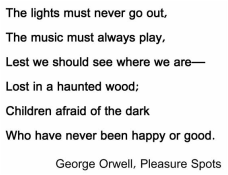|
Response by David Lowe, Member of St. Paul's
Orwell’s poem captured the busyness of life at the end of the second world war. Since then the problem has increased exponentially. We have little time to be alone with either God or ourselves and in any case few institutions encourage us to do so. On the other hand, new consumer electronics have provided a world of constant entertainment in which the music does not stop. Such a world leaves little room for a spiritual journey. For many faith traditions a spiritual journey starts with the notion of ‘stop and look.’ In some way we must stop our ordinary life and look at the world. That may include seeing the suffering of the world and our own responsibility for that suffering. If we never turn the music off long enough to consider the issues, then it is unlikely that we will ever begin that spiritual journey. The interior life of many people is characterized by existential anxiety. There are no more answers to the great questions of life and at least on some level we understand this. We can cover up this anxiety with entertainment but that does not make it go away. Similarly, we can look away from the suffering of the outside world and reject any notion that our lifestyle has anything to do with the suffering of third world populations, the plight of farm animals, or the oppressed peoples within our own borders. But on some level we know we are guilty. Denial is a poor psychological defense. Faith calls us to turn off the music and honestly face the world and ourselves. Our humanity depends on our responding to the world as it is, not as we imagine it to be. You are invited to share your response to this poem in our Discussion Group this Sunday, April 21st at 9:00 AM Also, Orwell's full essay is available to read here. |
Contact Us
435 S. 10th Street Join our Email Newsletter List! We send out weekly newsletters with upcoming events, photos from past events and news that pertains to the church.
|


 RSS Feed
RSS Feed